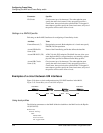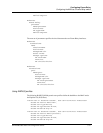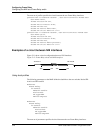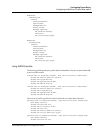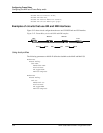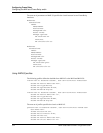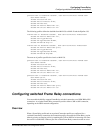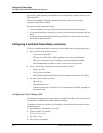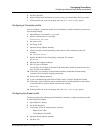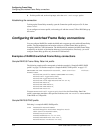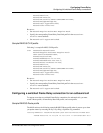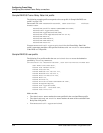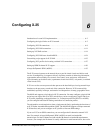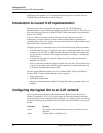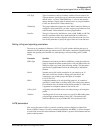
5-34 Preliminary January 4, 2001 MAX 6000/3000 Network Configuration Guide
Configuring Frame Relay
Configuring switched Frame Relay connections
rate of 64K or 56K, depending on the ISDN network configuration. Authentication can be by
DNIS and CLID.
Switched Frame Relay connections support the same logical interfaces as do nailed
connections: NNI, DTE, and DCE.
Keep the following information in mind:
• Your Frame Relay service provider must allow switched Frame Relay connections.
• A switched Frame Relay connection is a point-to-point connection and supports only one
DLCI.
• Verify that the Committed Information Rate of the DLCI(s) using switched connections
allow 56K or 64K connections.
Configuring a switched Frame Relay connection
To set up a switched Frame Relay connection, you must perform the following general steps:
1 Set up a Frame Relay profile as follows:
– Call Type set to Switched
– FR Type set to NNI, DTE, or DCE, depending on the network configuration
– FR Prof set to the name of the Frame Relay encapsulated Connection profile
– Data link information specified as given to you by your service provider
2 Set up a Frame Relay encapsulated Connection profile as follows:
– Encaps set to FR
– Call Type set to Switched
– Dial#, Calling# and Called# specified if you are authenticated with CLID or DNIS
3 Set up the Answer profile as follows:
– FR set to Yes
– Profile Reqd set to Yes
– Id Auth set to Require (for CLID) or set to Called Require (for DNIS), depending on
the authentication
Configuring a Frame Relay profile
The following example shows how to configure a switched Frame Relay NNI connection, but
you configure a switched DCE or DTE connection similarly.
To configure a Frame relay profile for a Frame Relay switched connection, proceed as in the
following example:
1 Open Ethernet > Frame Relay> any profile
2 Specify a Name. For example:
Station=fr-sw-fr
3 Set Active to Yes.
4 Set Call Type to Switched.



